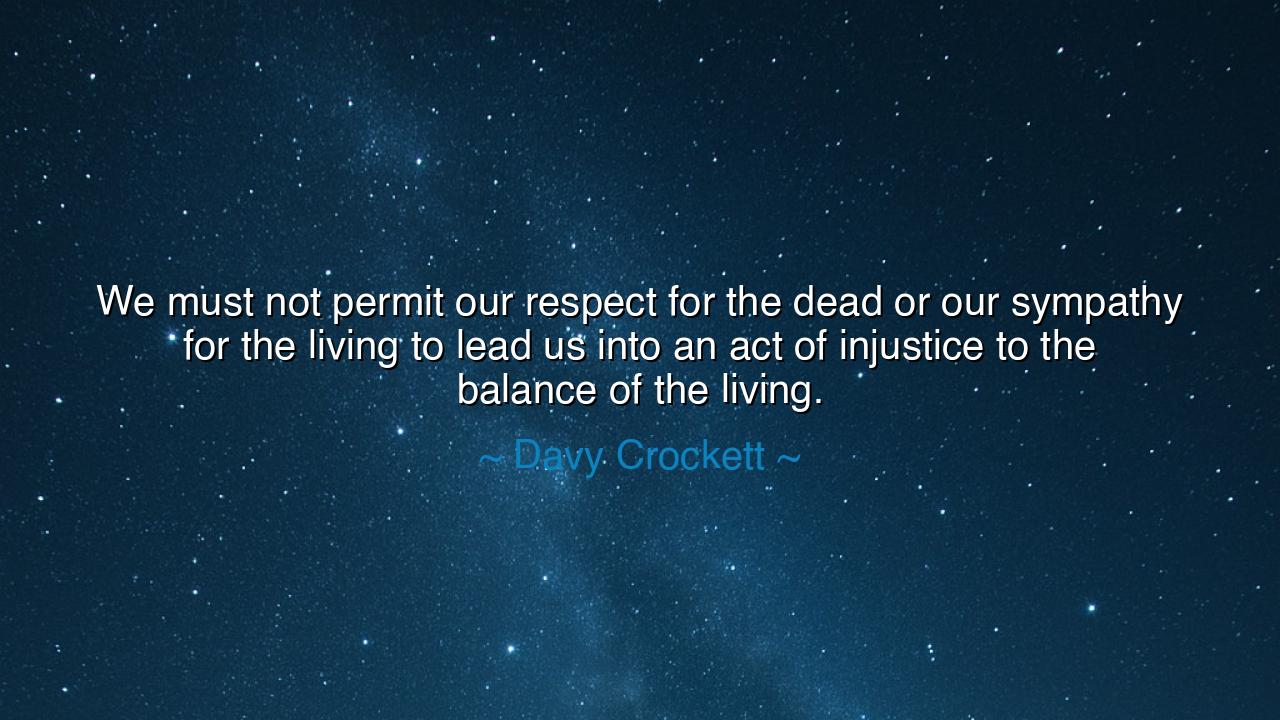
We must not permit our respect for the dead or our sympathy for
We must not permit our respect for the dead or our sympathy for the living to lead us into an act of injustice to the balance of the living.






Hear, O children of justice, the words of Davy Crockett, frontiersman, statesman, and warrior of the American wilderness, who declared: “We must not permit our respect for the dead or our sympathy for the living to lead us into an act of injustice to the balance of the living.” In these words resounds a timeless truth: that grief and pity, though noble in spirit, must not blind the eyes of justice. For to honor the dead and comfort the living is sacred, yet to twist the scales of fairness in their name is to bring new harm upon the world.
The origin of this wisdom lies in Crockett’s service as a legislator, where decisions bore weight not only upon individuals but upon the life of the nation. He saw how men, stirred by emotion, might pass laws or render judgments that favored one group at the expense of another. Out of respect for the fallen, they might demand tribute too costly for the living. Out of sympathy for the grieving, they might bend justice into partiality. Crockett, wise in the ways of hardship, declared that true righteousness does not yield to passion, but preserves the balance of the living.
Consider, O listener, the story of ancient Athens after the Peloponnesian War. In their grief for losses and in their fury against traitors, the Athenians condemned whole cities and peoples to destruction. Their respect for the dead and their thirst for vengeance blinded them, and in their judgment they created new injustices that only deepened their wounds. In time, they saw that their harsh decrees had weakened the fabric of their society. The lesson of Crockett rings here: to grieve is human, but to let grief destroy balance is folly.
The saying also reveals the wisdom of restraint. For even noble emotions, when ungoverned, become dangerous. The physician who allows sorrow for one patient to cloud his care for others does harm. The judge who allows sympathy for the accused to outweigh the law injures the innocent. The leader who allows pity for one people to blind him to the needs of all risks the ruin of many. Crockett teaches us that the highest form of justice is not coldness, but balance—tempered by compassion, yet not ruled by it.
Let us also remember the tale of Abraham Lincoln in the days of civil war. Countless mothers wept, countless families mourned, and Lincoln, with the tenderest heart, felt their grief. Yet when generals urged him to act rashly out of sympathy or vengeance, he chose the harder path of patience and measured judgment. He carried the sorrow of the people, yet he did not allow that sorrow to shatter the Union. His greatness lay in his ability to feel deeply, yet to govern wisely. So too does Crockett urge us: honor the grief of others, but do not let it unbalance the living.
O children of tomorrow, take this lesson to heart: emotions are holy, but justice is sacred. Let your respect for the dead be true, and let your sympathy for the living be deep, but never let them drag you into choices that bring fresh harm to others. To act justly is not to abandon compassion—it is to guide compassion with wisdom. In this way, you serve both the grieving and the greater balance of life itself.
Practically, this means weighing your decisions carefully when grief or pity presses upon you. When you see injustice, ask not only how to heal the sorrow before you, but how your actions will affect the many. When you give aid, give it wisely, so that it uplifts without unfairly burdening others. And when you honor the dead, do so with reverence, but let your reverence inspire justice, not vengeance.
Thus, Crockett’s words endure as a lamp for all generations: “We must not permit our respect for the dead or our sympathy for the living to lead us into an act of injustice to the balance of the living.” Let this be your guide, that you may walk with both compassion and clarity, with both reverence and wisdom, and so preserve the harmony of life for those who remain.






AAdministratorAdministrator
Welcome, honored guests. Please leave a comment, we will respond soon